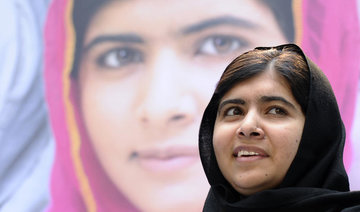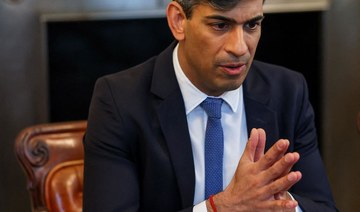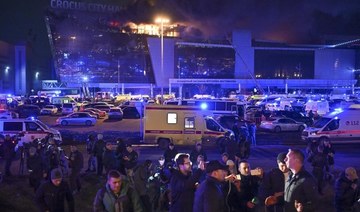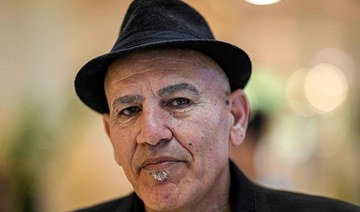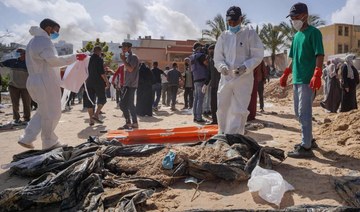DUBAI: Poor Pakistani parents want to send their children to school, but the quality of public schools is discouraging them from doing so, said the co-founder of The Citizen Foundation (TCF), the largest charity school chain in Pakistan.
Mushtaq Chhapra, who started the education network in Pakistan with his friends more than 20 years ago, said the lack of good schools and academic facilities has been a major challenge.
He blamed the nationalization policy in 1973 that damaged the infrastructure of government schools in the country.
“Government schools are closing down. They are in a state of disrepair. Teachers don’t go to the schools. No toilets, no furniture, and even no books. Nobody is accountable which is the core of the problem in our system. In this situation, why do we blame poor students who are getting such a rough deal?” Chhapra said during a visit to Dubai.
“How can you expect them to go to the colleges? If there is no one to teach them, they will roam around the streets, get into militancy, drugs, and abuse.”
According to the Pakistan Education Statistics 2015-16, 44 percent of children between the ages of five and 16 were out of school. The statistics revealed that 21 percent of primary schools in the country were being run by a single teacher while 14 percent had only one room.
With regard to infrastructure, 4 out of 10 public sector primary schools were operating without electricity, 28 percent did not have toilets, 25 percent had no boundary walls and 29 percent had no access to drinking water. More than 40 percent of the schools were housed in unsatisfactory buildings, while 7 percent had no building at all.
Chhapra — a recipient of the Sitara-e-Imtiaz, which is one of the highest civil honors in Pakistan — was in Dubai to meet the Pakistani community and share the annual progress of TCF schools and their students’ success stories.
TCF is now running 1,482 schools in more than 700 locations throughout the country, and has a total enrolment of 220,000 students. It started in 1995 and is now the largest non-profit private education system in the country for the less privileged.
Chhapra is proud of the fact that 50 percent of TCF’s students are girls and that his organization employs women as academic staff and support staff, providing an excellent working opportunity for them.
“Wherever we go in the country, we never face problems or resistance regarding school admission, even for girls. We provide education to boys and girls together in the same class without any problem.
However, he said there were concerns by several students about male teachers.
“We realized the issue and decided to employ women teachers and school staff. In this way, not only the gender balance is taken care of but we are also giving the message to our girl students that whenever they finish the required education, there is a job waiting for them. It’s a win-win situation.”
Chhapra said TCF is ready to share the success of its education system with “any part of the world.”
“Education is the right of every child in the world. The education system we have developed at our TCF schools can be transplanted in any part of the world. The only difference will be the language.”
He said that while Pakistan may use Urdu, other countries can use their own languages.
“Other than that, the education system, teacher guide, books — everything can be implemented anywhere in the world.”
“We are open and prepared to help anybody who needs to take our system. We are prepared to train their teachers. We are prepared to help them to establish the education system in any way they want.”
He did, however, clarify that TCF will not be able to run the schools outside Pakistan.
“Only because our work is still unfinished in Pakistan. We have to meet our task in Pakistan first. There are many areas that still need a lot of work, especially when we are now working to adopt government schools.
“So physically, we cannot run the school outside Pakistan such as in Africa or Bangladesh, but we are ready and prepared to teach them, guide them and prepare them in the best possible way,” he said.
Poor education system deters Pakistanis from sending children to schools, says education charity
Poor education system deters Pakistanis from sending children to schools, says education charity

- Lack of educational infrastructure and poor educational facilities deter Pakistanis from sending their children to school
- 44 percent of children in Pakistan do not go to school
Google fires at least 20 more workers who protested its $1.2bn contract with Israel
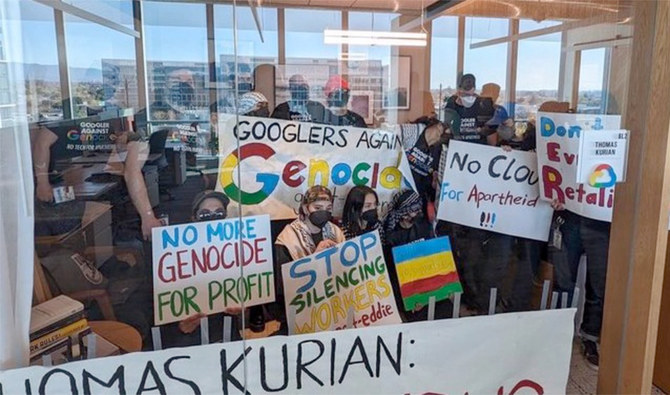
NEW YORK: Google fired at least 20 more workers in the aftermath of protests over technology the company is supplying the Israeli government amid the Gaza war, bringing the total number of terminated staff to more than 50, a group representing the workers said.
It’s the latest sign of internal turmoil at the tech giant centered on “Project Nimbus,” a $1.2 billion contract signed in 2021 for Google and Amazon to provide the Israeli government with cloud computing and artificial intelligence services.
Workers held sit-in protests last week at Google offices in New York and Sunnyvale, California. The company responded by calling the police, who made arrests.
The group organizing the protests, No Tech For Apartheid, said the company fired 30 workers last week — higher than the initial 28 they had announced.
Then, on Tuesday night, Google fired “over 20” more staffers, “including non-participating bystanders during last week’s protests,” said Jane Chung, a spokeswoman for No Tech For Apartheid, without providing a more specific number.
“Google’s aims are clear: the corporation is attempting to quash dissent, silence its workers, and reassert its power over them,” Chung said in a press release. “In its attempts to do so, Google has decided to unceremoniously, and without due process, upend the livelihoods of over 50 of its own workers.”
Google said it fired the additional workers after its investigation gathered details from coworkers who were “physically disrupted” and it identified employees who used masks and didn’t carry their staff badges to hide their identities. It didn’t specify how many were fired.
The company disputed the group’s claims, saying that it carefully confirmed that “every single one of those whose employment was terminated was personally and definitively involved in disruptive activity inside our buildings.”
The Mountain View, California, company had previously signaled that more people could be fired, with CEO Sundar Pichai indicati ng in a blog post that employees would be on a short leash as the company intensifies its efforts to improve its AI technology.
Britain’s home secretary touts UK-Rwanda migrant deportation deal during visit to Italy

- Deal, in which Britain will pay Rwanda to process the migrants, is aimed at deterring people from crossing the English Channel from France
- It is similar in some basic aspects to Italy’s controversial pact to outsource the processing of asylum-seekers to Italian-run centers in Albania
ROME: Britain’s home secretary on Tuesday touted Britain’s migrant deportation deal with Rwanda as a “new and creative” deterrent to an old and growing problem. But he said he took seriously criticism by the UN refugee agency that it violates international law.
Home Secretary James Cleverly visited Italy, ground zero in Europe’s migration debate, hours after the UK Parliament approved legislation to enable the government to deport some people to Rwanda who enter Britain illegally.
The deal, in which Britain will pay Rwanda to process the migrants, is aimed at deterring people from crossing the English Channel from France. It is similar in some basic aspects to Italy’s controversial pact to outsource the processing of asylum-seekers to Italian-run centers in Albania.
Human rights groups have said both deals, forged by conservative governments amid anti-migrant sentiment among voters, violate the rights of migrants that are enshrined in international refugee conventions.
On Tuesday, the UN High Commissioner for Refugees said the UK-Rwanda deal is “not compatible with international refugee law” because it uses an asylum model “that undermines global solidarity and the established international refugee protection system.”
Cleverly defended the deal as a necessary response to a problem that has outgrown the international institutional way of processing migrants. He said Britain will not tolerate people smugglers determining who arrives on British soil.
“People-smuggling mass migration has changed (and) I think demands us to be constantly innovating,” he told a gathering at the Institute of International Affairs, a Rome-based think tank.
He said he took seriously the UNCHR criticism and said Britain was a law-abiding country.
“Of course we will respect the UN enormously,” he said when asked about the UNHCR criticism. “We take it very, very seriously. Doesn’t mean to say we always agree with their assessment. But we will, of course, look at that.”
Cleverly visited the Italian coast guard headquarters on Tuesday and on Wednesday is to visit the Sicilian island of Lampedusa, where tens of thousands of migrants have arrived after crossing the Mediterranean Sea on boats setting off from northern Africa.
Lampedusa is closer to Africa than the Italian mainland and is often the destination of choice for migrants, whose numbers reached 157,652 new arrivals in Italy last year.
The numbers arriving in Italy so far this year are actually way down, presumably thanks to Italy’s European Union-endorsed agreement with Tunisia to stem departures. As of Tuesday, 16,090 migrants had arrived by sea in Italy so far this year, compared to 36,324 in this period last year.
Spain has actually outpaced Italy so far this year in terms of migrant sea arrivals, with 16,621 arriving this year as of April 15, the last available date.
In Britain, the numbers pale in comparison to the southern Mediterranean, even during peak periods: In 2022, the number of people arriving in Britain from across the Channel reached 45,774, though last year the number dropped to 29,437.
Ukraine suspends consular services abroad for men of fighting age

- Ukraine’s foreign affairs ministry “announced a temporary suspension of accepting new applications for consular services” for men between 18 and 60
- It made an exception for documents allowing Ukrainians to return to Ukraine
KYIV: Ukraine authorities on Tuesday suspended consular services for men of fighting age living abroad, after announcing measures to bring them home amid manpower shortages in the army fighting Russia.
Ukraine’s army has been struggling to hold frontlines, partly due to a lack of soldiers over two years into Russia’s invasion.
Ukraine’s foreign affairs ministry “announced a temporary suspension of accepting new applications for consular services” for men between 18 and 60.
It made an exception for documents allowing Ukrainians to return to Ukraine.
The move would likely oblige Ukrainian men to return from abroad to undergo administrative procedures that were previously available abroad.
The government has already adopted a mobilization law, due to come into force on May 18, that toughens penalties against draft dodgers and obliges men to keep their military registration up-to-date.
The ministry said men would be able to access consular services once the law came into force and “after updating their military registration.”
“Male citizen of Ukraine aged 18 to 60 with valid military registration documents will have full access to consular services,” the ministry said.
Ukrainian men have been forbidden to leave the country since the invasion began, apart from a few exceptions.
But some lived away before the war began, and Ukrainian media estimates that thousands more illegally fled the country.
Major arrests at NYU campus as Gaza protests spread
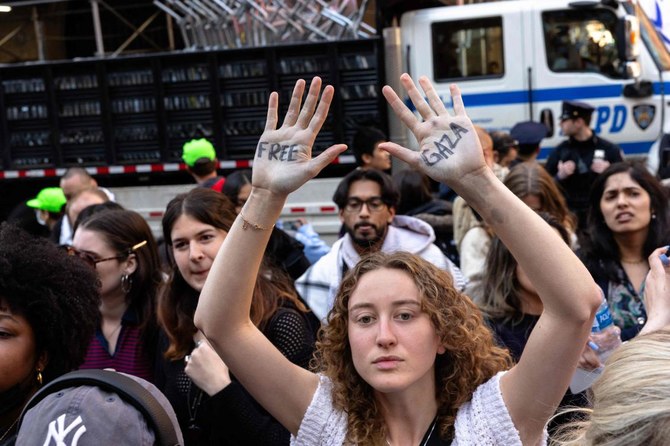
- Some of America’s most prestigious universities have been rocked by protests in recent weeks
- On Tuesday, the New York Police Department said 133 people had been arrested at NYU and released after being issued with court summons
NEW YORK: More than 130 people were arrested overnight during pro-Palestinian protests at the New York University campus, as student demonstrations gather pace in the United States over the Israel-Hamas war.
Some of America’s most prestigious universities have been rocked by protests in recent weeks as students and other agitators take over quads and disrupt campus activities.
The demonstrations come amid sweeping debates over Israel’s assault on Gaza, following Hamas’s deadly invasion on October 7.
Such bastions of higher education — Harvard, Yale, Columbia and others — are grappling for a balance between students demanding free speech rights and others who argue that campuses are encouraging intimidation and hate speech.
On Tuesday, the New York Police Department told AFP that 133 people had been arrested at NYU and released after being issued with court summons, as protests also intensify at Yale, Columbia University and other campuses.
As the holiday of Passover began Monday night, police began detaining demonstrators at an encampment at NYU who had earlier refused orders to disperse.
A New York University spokesman said the decision to call police came after additional protesters, many of whom were not thought to be affiliated with NYU, suddenly breached the barriers erected around the encampment.
This “dramatically changed” the situation, the spokesman said in a statement on the school’s website Monday, citing “disorderly, disruptive and antagonizing behavior” along with “intimidated chants and several antisemitic incidents.”
“Given the foregoing and the safety issues raised by the breach, we asked for assistance from the NYPD. The police urged those on the plaza to leave peacefully, but ultimately made a number of arrests.”
The spokesman said the school continues to support freedom of expression and the safety of students.
But protests have grown large and disruptive enough — New York Police Department spokesmen have spoken of their officers facing violence when confronting protesters at NYU — to draw the attention of President Joe Biden and his administration.
“Anti-Semitic hate on college campuses is unacceptable,” US Secretary of Education Miguel Cardona posted on X on Tuesday, expressing concern about the unrest.
The protests began last week at Columbia University, also in New York, with a large group of demonstrators establishing a so-called “Gaza Solidarity Encampment” on school grounds.
But more than 100 protesters were arrested after university authorities called the police onto Columbia’s campus Thursday, a move that seemingly escalated tensions and sparked a greater turnout over the weekend.
Social media images late Monday appeared to show pro-Palestinian Jewish students holding traditional seder meals inside the protest areas on campuses including at Columbia.
There were also demonstrations at MIT, the University of Michigan, UC Berkeley and Yale, where at least 47 people were arrested Monday after refusing requests to disperse.
France arrests eight in PKK financing probe
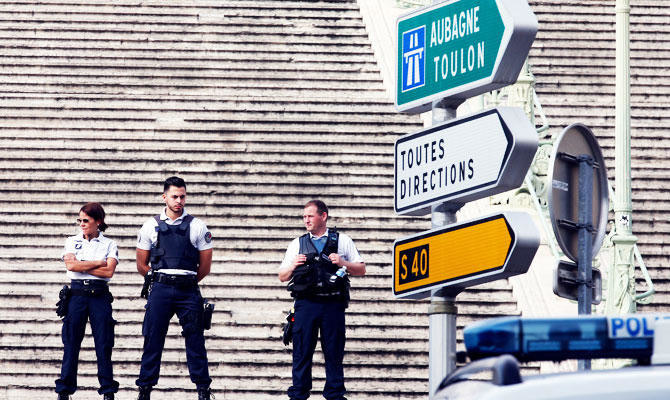
- The arrests took place in the Paris region and in southern France, the PNAT anti-terror unit said
- French prosecutors suspect the eight of preparing and financing terrorist acts
PARIS: French police arrested eight men on Tuesday as part of an investigation into the finances of the Kurdistan Workers Party (PKK), banned as a terror organization by Turkiye and its Western allies, anti-terrorism prosecutors told AFP.
The arrests took place in the Paris region and in southern France, the PNAT anti-terror unit said.
The PKK has been designated a terrorist organization by Turkiye, the United States and the European Union.
French prosecutors suspect the eight of preparing and financing terrorist acts, and of conspiring to extort, or attempt to extort, funds to finance a terrorist organistion between 2020 and 2024, the PNAT said.
Investigators believe the eight to be connected to a campaign to collect funds from Kurdish business people and other Kurds in France, a source close to the case added.
Police can hold the suspects for up to 96 hours for questioning, the source said.
Another source said the funds were destined for use in Belgium, where police on Monday raided Kurdish-run media as part of a probe undertaken at the request of a French anti-terror judge, the PNAT said.
The PKK has waged a decades-long insurgency for greater autonomy for the Kurdish minority of Turkiye in the southeast of the country, in a standoff with the Ankara government that remains unresolved to this day.



